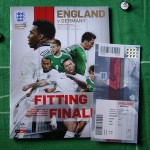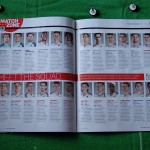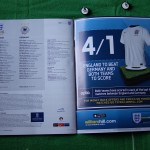Friendly International
Wembley Stadium, Wembley, 19.11.2013
![]()
1-0 (1-0)
Mertesacker 39. / –
England: Hart – Walker, Smalling, Jagielka, A. Cole (52. Gibbs) – Cleverley (64. Wilshere), Gerrard (c) (56. Henderson) – Lallana (76. Lambert), Townsend – Rooney (71. Barkley) – Sturridge
Germany: Weidenfeller – Westermann (66. Draxler), Boateng (46. Hummels (66. Höwedes)), Mertesacker (c), Schmelzer (46. Jansen) – L. Bender, S. Bender – Götze, Kroos, Reus (82. Schürrle) – Kruse (56. Sam)
Colours: Germany – green shirts, white shorts, green socks; England – white shirts, navy blue shorts, white socks
Referee: Stéphane Lannoy (France)
Assistants: Frédéric Cano, Michael Annonier (France)
Fourth Official: Laurent Duhamel (France)
Yellow Cards: – / –
Red Cards: – / –
Attendance: 85,934
Match Programme Details
Surprisingly given increasing costs elsewhere, the American A4-sized England programme is even better value than it was in 2007 for the last meeting between the two sides – retaining its cover price of £6 while having the same seventy-four pages of content.
The action-packed cover features a stylised composite image of three players from each team: Daniel Sturridge, Andros Townsend and Wayne Rooney for England, and André Schürrle, Mesut Özil and Max Kruse for Germany. Unfortunately, Özil would be rested for this showpiece fixture. This was exactly the same scenario as the 2007 edition, which had featured the injured Bastian Schweinsteiger.



Aspect: Portrait
Dimensions: 275 x 210 mm (American A4)
Numbered Pages: 74
Language(s): English
Match Report
With both teams having qualified comfortably for the World Cup finals in Brazil, the meeting at the end of 2013 was a chance to round off the year on a good note. Germany arrived at Wembley in decent form having had the better of a 1-1 draw in Milan against Italy four days earlier, while Roy Hodgson’s England side were looking to avoid the ignominy of back to back home defeats having lost 2-0 to Chile.
With just the one defeat in 2013 – a 4-3 reverse against the USA when fielding what could best be described as a third-string team – Joachim Löw’s free-scoring side had won eight of their eleven matches, scoring thirty-four goals in the process.
With the core of the squad being made up of the young players who had established themselves after the 2012 World Cup in South Africa – where they had beaten England 4-1 in that memorable meeting in Bloemfontein – the look of the German side would be dramatically different from the one that had last visited Wembley in 2007. Of the class of 2013, only one had played in the 2007 fixture: stand-in captain Per Mertesacker.
The build up to the match would see the German coach rest a number of key players – a move that would prompt accusations of his not taking the match seriously. In addition to having to contend with a growing injury list, the resting of skipper Philipp Lahm, goalkeeper Manuel Neuer and playmaker Mesut Özil – all seen as indispensable first choices – would leave the Nationaltrainer with what would be described by both the German and English media as a B-team.
Nobody would really consider that many of the Nationalmannschaft’s second-string were not half bad either. The talented Mario Götze would be given a rare start – only his eleventh in twenty-six appearances – while the talented twins Lars and Sven Bender would start for the very first time in the national colours since their days in the Under-21 team. Germany would also have a new name in goal, but one of great experience in the form of thirty-three year old Roman Weidenfeller. Despite being the Mannschaft’s oldest goalkeeping debutant it would be not the first time the Borussia Dortmund Torhüter would step out for a prestige match at Wembley: he had been part of the side that had taken the club to the Champions’ League final against FC Bayern München earlier in the year.
Germany might have have been without Neuer, Lahm, Schweinsteiger, Khedira, Gündoğan, Özil, Klose and Gómez, but in the coach’s mind there would be more than enough talent in reserve. When the final line-ups were announced, he would even leave the in-form André Schürrle and Thomas Müller – one of England’s tormentors in Bloemfontein – on the bench.
England for their part would field a team most consisting of younger players, with the core of experience being provided by Ashley Cole, skipper Steven Gerrard and striker Wayne Rooney. In goal manager Hodgson would select Manchester City’s experienced but unpredictable Joe Hart, who was in such poor form he couldn’t even get a start for his club.
While both sides would be pretty similar in terms of age, there would be a considerable gulf in experience. While all of the German players would have extensive experience at club level, some of the starters in the England side would not even be first choices in their domestic league. One of the Three Lions’ brightest new stars, Tottenham Hotspur winger Andros Townsend, could only claim fifteen first-team games for Spurs in a career where he had been loaned out to no fewer than nine different clubs.
The home side would take to the field in white and a very dark navy blue ensemble – looking uncannily like the Germany team of 1974 but without the big hairstyles – while the Mannschaft would be playing in their change colours of green and white. With the Lindengrüntrikot set to be replaced in 2014, this would be the last outing for this design.
England had not beaten Germany at home since 1975 – a run of five matches including the semi-final penalty shootout at Euro 1996 – and knew that defeat would not only extend this run but also make the unfortunate Hodgson the first coach to lead the team to back to back defeats at Wembley since Don Revie in 1977.
After the almost obligatory jeering of the German national anthem by a number of home supporters, the game would get underway on what would be a dry yet crisp November evening in North-West London. It would be five years to the day since the last friendly meeting between the two teams in Berlin’s Olympiastadion, which would see England – then under Fabio Capello – inflict a 2-1 defeat on the Mannschaft with captain John Terry heading home the winner just six minutes from time.
Determined to put up a better show than they had done against Chile four nights earlier, England would start off brightly. In fact, the home team would be so dominant in the opening quarter of an hour that the Germans would hardly get a sniff of the leather.
For all their energy, England would be unable to threaten Weidenfeller in the German goal. They would make a series of sharp bursts down the flanks with Townsend in particular causing a few nervous moments for left-back Marcel Schmelzer, but the green-shirted defence would close ranks just at the tight time to prevent the shot on goal. The German midfield meanwhile would be conspicuous by their absence, with both Götze and Toni Kroos floating around aimlessly.
Westermann and Rooney would head over the bar for either side, but as the game reached the half hour mark there would be nothing much to write home about. The home side would huff and puff for little reward, Germany would be solid at the back while missing their usual spark in midfield, and perhaps the most noteworthy moment would be an attempted pass from Kroos that would be beyond poor.
It was hardly earth-shattering stuff, and the best German player on the pitch would be the excellent Jérôme Boateng who would judge every challenge perfectly – and even make Daniel Sturridge tread on the ball.
As the clocked ticked towards half-time the Mannschaft would finally start to come into the game, and Kroos in particular would wake up from his slumber. Seven minutes from the break a bustling run from Lars Bender would result in a German corner, and finally someone would flick the switch. Kroos’ corner would be met by Mertesacker, only for Hart for dive brilliantly to his left and deny the tall centre-back. Westermann would then have his header half-cleared, and Kroos would reassert control down the right before chipping in the perfect cross into the England box.
This time, Mertesacker would make no mistake as he guided his header past the ‘keeper into the left side of the net. Out of nowhere, Germany would have the lead.
Having endured what had felt like relentless pressure from their hosts, Löw’s side were now able to relax a little more – and as a result would look a whole lot better. Boateng would be on hand again to foil Adam Lallana and Gerrard would send a well-struck effort the bar, but as the first half ended Hodgson’s side hadn’t registered a single shot on target. For Weidenfeller in the German goal, he would be halfway through what was looking like an easy debut.
England had looked the sharper and more committed of the two sides, but for all their efforts would have nothing to show for it. Germany meanwhile would just do their thing, and turn two minutes of concerted pressure into a goal. Some might have considered the home side slightly unlucky, but for those of us in the know it would be pretty much par for the course for matches between these two sides.
The start of the second half would see Jogi Löw make two changes as Mats Hummels and Marcell Jansen replaced the impressive Boateng and the occasionally harried Schmelzer, and after a frenetic start by the home side Germany would finally start to assert their authority on the game. Having worked his way back into gear Götze would show off his dancing feet, Marco Reus would test Hart with a well-struck shot, and Reus would slice through the white-shirted defence before being left in no-man’s land with Max Kruse unable to keep up.
By now, the German passing game had clicked into gear, with Kroos looking a completely different player. The FC Bayern man would take command of the midfield, and the introduction of Bayer Leverkusen’s Sidney Sam for the disappointing Kruse would add further pace and bite to Germany’s fast breaks.
Townsend would hit the outside of the post just short of the hour mark with a rasping effort, but this would be the closest England would get. Weidenfeller still hadn’t needed to make a save, and with Kroos and the also reawakened Götze now looking sharp the men in green would look good for a second goal and what would surely be the coup de grâce.
With the Germans now able to play their relaxed and patient brand of football and the home side getting increasingly desperate, the lean, green passing machine would take control. The patience would lead to opportunities, and the excellent Hart would pull out another brilliant stop to deny Götze on sixty-five minutes after the Bayern youngster had linked up with the impressive Sam. Sam would also have a half-chance of his own just minutes later, but Hart would come to the rescue yet again as he forced the Leverkusen speedster to dink the ball harmlessly over the bar.
As the match entered the final quarter of an hour the small visiting contingent would be in fine voice, greeting every pass with a loud cheer and breaking into a mocking rendition of Football’s Coming Home. It would be just a simple matter of the guiding the ship home safely to harbour, securing yet another Wembley win.
England would make one last push in the final ten minutes, but the German defence would continue to do things right, with Jansen looking particularly impressive. The German defence would be rejigged slightly with the premature withdrawal of Hummels after sixty-six minutes, but Schalke 04 skipper Benedikt Höwedes would slip seamlessly into the central defensive role to see things through to the end. Roman Weidenfeller meanwhile would complete the easiest of debuts, without having to make a single save.
The final whistle would signal yet another successful evening at Wembley for the Germans, one that would be even sweeter considering the absence of so many first choices. Despite their energy and commitment England would be given yet another footballing lesson by their old rivals, and their dismal record at home against the Mannschaft would be extended further still.
In short, England had been made to eat their greens.
Cumulative Record
Home: played 13, won 3, drawn 3, lost 7. Goals for 18, goals against 32.
Away: played 13, won 7, drawn 0, lost 6. Goals for 14, goals against 26.
Neutral: played 7, won 4, drawn 1, lost 2. Goals for 10, goals against 9.
Overall: played 33, won 14, drawn 4, lost 15. Goals for 42, goals against 67.
Competitive: played 12, won 7, drawn 2, lost 3. Goals for 18, goals against 17.

was you in the stadion?
No, but I know someone who was. I was in Scotland that week. 🙂